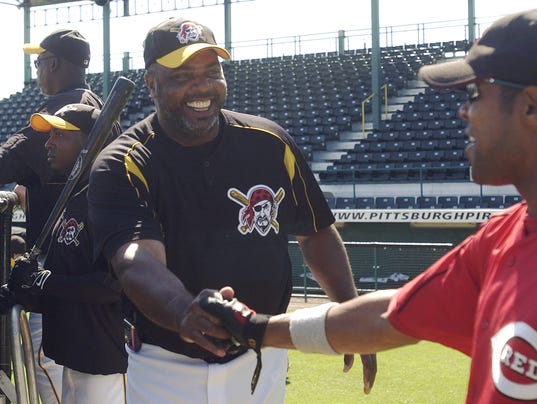Paul Daugherty, USA TODAY Sports
June 11, 2016

Dave Parker and Barry Larkin in spring training 2004. (Photo: Al Behrman, AP)
On Friday, the day Muhammad Ali was laid to rest,Dave Parker walked carefully through the pouring rain to the pro shop at Avon Fields Golf Course, to pay tribute to his hero. He brought two photographs of Ali and a head full of memories. Parkinson’s disease is terrible, but not so terrible that it steals your spirit. Ali died with his spirit intact. Parker thrives because of his.
They weren’t that different, Ali and the Cobra. Parker was one of a legion of athletes and ordinary folks emboldened and uplifted by Ali’s personality. You had to have lived through the 1960s to understand how thoroughly Ali rocked the conventional sports world. Until then, athlete-heroes were expected to do their work and keep an aw-shucks profile.
“He carried the torch for me to be the player I was,’’ Parker said. “My mark is on baseball, but Ali started it. He gave me the opportunity to express my personality, and speak for things I believed in.’’
Ali was irrepressible. He rhymed. So did Parker: “When the leaves turn brown, I’ll be wearing the batting crown,’’ Parker declared in 1977 and ’78. Parker did, in fact, win the National League batting title both years. “Ali had that influence on me,’’ he said. “When you put yourself on the line, you have to fight to live up to whatever you say you’re going to do, and Ali did that. I picked up on that.’’
It has been almost four years since Parker’s diagnosis. He bears the telltale signs of Parkinson’s, most obviously the tremors in his hands and, less obviously, his head. His short-term memory comes and goes. “You can be talking and forget what you’re talking about,’’ Parker said. “You can get it out there and sometimes it leaves.’’
On this day, Parker has no memory issues. For 30 minutes, past is present and the memories are sweet.
He was supposed to fight Ali in 1981, for charity. That was a strike year in baseball. The exhibition was scheduled during the work stoppage. For Parker, the best thing about the strike ending was returning to the field. Second-best was not having to get in the ring with Ali.
Parker had a little experience, having boxed as a 210-pound high school sophomore out of Findlay Street Neighborhood House . But he wasn’t all that fond of it. “They hit you back in boxing. That was a problem,’’ he said Friday.
He brought with him a photo of Ali, entertaining Parker and his teammates in the California Angels clubhouse in 1991. The Champ had come to see Parker and Dave Winfield . It was the last of Parker’s 19 years in baseball. He recalls the scene as if it were this morning:
“He had guys staring at the heels of his shoes. He told them he could float like a butterfly. Then he got up on his toes real slowly and brought his body up. You got caught up in what he’s saying, you really think he’s floating,’’ Parker said. “That was Ali, man.’’
When Parker expresses his sadness for Ali, he sounds like me, expressing my feelings for Parker. I was a kid in the ‘70s, during Parker’s best seasons with the Pirates, my favorite team. I was 21 in 1979, a kid fresh out of college, living and working in a strange place where I knew no one. My best friend was the radio, which picked up the distant signal of KDKA, the Pirates flagship station.
Parker had a very good year (.310, 25 homers, 94 RBI) and Pittsburgh won the World Series. Parker’s talent and panache embodied that team. It seems like yesterday, only it isn’t. Dave Parker turned 65 last Thursday, and he has Parkinson’s. “Some days I’m good, some days I’m not,’’ he said.
Parker takes seven pills a day and when the weather’s right, plays 18 holes of golf three times a week. He also says getting out of bed can be hard. “You gotta rock to kind of get yourself to the side of the bed,’’ he explained.
He cried as a 19-year-old in 1971, when Joe Frazier beat Ali in the first of their three fights, and he cried again last week, when Ali passed. It reminded Parker of his own mortality, of course. But more than that, he’d lost his main inspirer. Sports heroes have sports heroes, too.
I asked him what he’d take from Ali’s life.
“One, his boxing ability,’’ Parker said. “Secondly, what he ended up meaning to the world. He was a diplomat for the world.’’
Parker pulled a second photo from a slim cardboard box. It’s a black-and-white copy of the iconic shot of Ali, towering over a fallen Sonny Liston . “To Dave, Muhammad Ali’’ is inscribed in gold ink.
Parker stares a few seconds at the photo. Then he says, “Ali, you did it well. Better than anybody.’’
Paul Daugherty writes for the Cincinnati Enquirer , part of the USA TODAY NETWORK


No comments:
Post a Comment